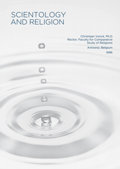1. “Truth vs. Small-minded Religious Dogma” in “Self-Realization,” U.S.A., Winter 1995, Vol. 67, No. 1. p. 32
2. Christian Science was founded under similar circumstances to Scientology, starting with questions about mental healing. Mary Baker Eddy’s main principles were that God is Mind and Spirit and that He is good. Because He is good, His works (creations) are also good. In other words, matter, sin, sickness and death do actually not exist. The person who accepts this is enlightened. The person who lives according to the teachings of Jesus will have a good physical and spiritual life.
3. Membership, marriage and other formalities are likewise that of the Religious Society of Friends (the Quakers) without a fixed form of liturgy, although there are examples of certain set patterns depending on the cultural environment. See, for example, “Church Government” of the London Yearly Meeting of the Religious Society of Friends. (Friends Book Centre, London 1968.)
4. Like the writings of Hubbard in Scientology, the writings of E. Swedenborg are sacred (revelational experiences) and are to be used by its followers according to the steps as set out by the author. Translations are used, but for the basic doctrines, one should go back to the original language. Dictionaries are seen everywhere in these Centres. In certain New Churches of Jerusalem, such as the one in Den Haag, the Netherlands, the reading is from the Latin original texts (Swedenborg wrote in Latin) and the minister will comment as profoundly as possible. Only ministers who read Latin can be ordained. The original writings of Ron Hubbard are used with the same care. (“The Religion of Scientology,” 1994, page 5.)
5. (Père) Louis-Joseph Antoine (1845–1912) was a Belgian miner who after reading the book Livre des Esprits by A. Kardec founded numerous churches, called temples, (in Belgium and also in Germany, France, Poland and countries in Africa and South America) where healing ceremonies took place. He was not a Christian. As a structural theosophist (he called himself the founder of “New Spiritualism”) he was open to all forms of religious doctrines, especially from the East. His teaching: “Toute matière est illusion; le mal n’existe pas en soi mais est un produit de notre imagination. Le bonheur consiste à être dépouillé de tout désir, provoqué par la vue des formes changeantes et illusoires de la matière. De réincarnation en réincarnation, notre esprit atteindra un jour la libération.” The Dictionary of Religions (University Press of France) calls this religion a sort of primitive Buddhism. His spiritual healing of the sick brought him to court in 1901 and 1907 (both the clergy and the legal medical authorities accused him), where he, after arduous debate, was found innocent. Virtually the same happened to Mary Baker Eddy, George Fox and Emmanuel Swedenborg. Scientology has suffered similar persecution in some areas.
6. The tradition of barbarism, The Phoenix Lectures, p. 33. (Publications Organization World Wide, 1968.)
7. Rabbi A. Malinsky concerning “the progress of technical science and the decline of man” in “Acta Comparanda II,” Antwerp 1987, p. 7.
8. The Phoenix Lectures p. 33.
9. In psychoanalysis, for instance, the analyst does not accept what the person says but interprets it, evaluates his condition for him, etc. This is the antithesis of Scientology auditing, wherein the auditor (“one who listens” from Latin audire, to listen) is expressly forbidden to evaluate for the individual. The person finds his own answers. (What is Scientology? Bridge Publications, 1992 p. 163.)
10. In Have You Lived Before This Life? Although the original meaning of the term karma simply means “deed,” it has, in relation with the theory of causation, come to be popularly regarded as a kind of potential power gained as a result of every deed done in the past. That is, all past acts result in either good or bad, suffering or pleasure, depending upon the act, and it has an influencing power upon the future, and this is regarded as one’s karma. It is believed that if a good deed will be repeated, good will be accumulated, and its potential power will function upon the future as a beneficial influence. (See, e.g., of “The Teaching of the Buddha,” Bukkyo Dendo Kyokai, Tokyo 1966, p. 300).
11. The Phoenix Lectures, p. 315.
12. The most important objective facts (“dogma”) within Scientology are Hubbard’s writings, starting with Dianetics. These are to be encountered and resolved by the student himself. The duty of the auditor or supervisor is only to assist the parishioner.
13. In “The Church of Scientology,” p. 2.




























